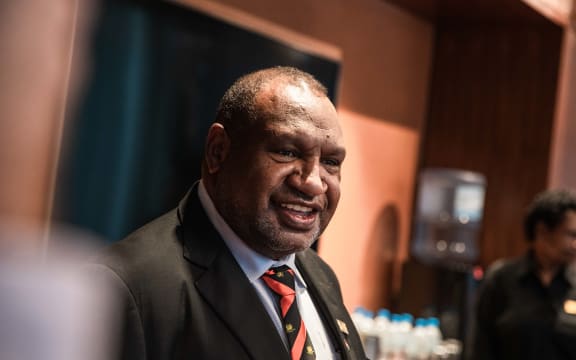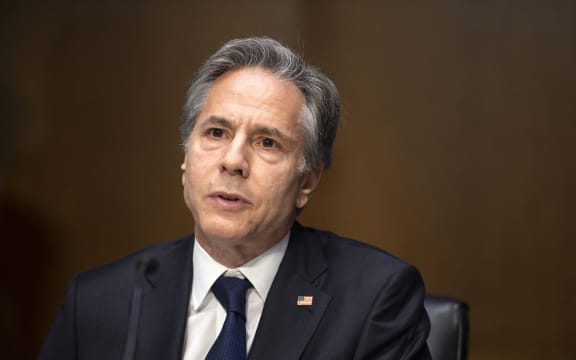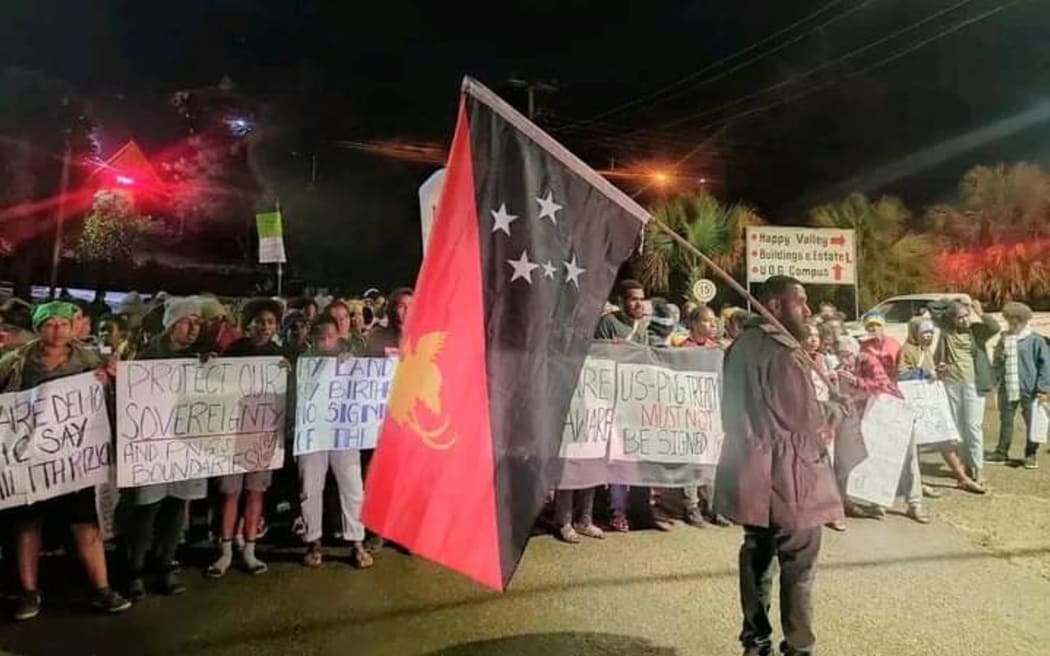By Lydia Lewis and Scott Waide in Port Moresby
Papua New Guinea Prime Minister James Marape says the increased United States security involvement in Papua New Guinea is driven primarily by the need to build up the Papua New Guinea Defence Force and not US-China geopolitics.
Last night, despite calls for more public consultation, the US Secretary of State Antony Blinken and Papua New Guinea’s Minister for Defence, Win Bakri Daki, penned the Bilateral Defence Cooperation and Shiprider agreements at APEC House in Port Moresby.
Prime Minister Marape said the milestone agreements were “important for the continued partnership of Papua New Guinea and the United states.”
- READ MORE: Analysis: Memories of war haunt ‘slippery slope’ to a militarised Pacific – Barbara Dreaver
- UPNG student protesters call for ‘transparency’ over US defence pact
- There must be clarity’ – PNG students protest over US defence deal
- Security pact: PNG expects more US military boots on ground
- Pacific leaders arrive in Port Moresby ahead of Modi and Blinken PNG visit
- OPM calls on global trade unions to blacklist Indonesian goods, services
- Other US defence pact reports
“It’s mutually beneficial, it secures our national interests,” he said.

He said the penning of the new defence pact elevated prior security arrangements with the US under the 1989 Status of Forces Agreement.
Despite public criticism, Marape maintains the agreements are constitutional and will benefit PNG.
The Shiprider agreement will act as a vital mechanism to tackle illegal fishing and drug trafficking alongside the US, which is a big issue that PNG faces in its waters, Marape said.
“I have a lot of illegal shipping engagements in the waters of Papua New Guinea, unregulated, unmonitored transactions take place, including drug trafficking,” he said
“This new Shiprider agreement now gives Papua New Guinea’s shipping authority, the Defence Force and Navy ‘full knowledge’ of what is happening in waters, something PNG has not had since 1975 [at independence],” Marape said.

Secretary of State Antony Blinken echoed those sentiments and stressed that the US was committing to the growing of all aspects of the relationship.
“Papua New Guinea is playing a critical role in shaping our future,” Blinken told the media.
He said the defence pact was drafted by both nations as “equal and sovereign partners”.
It was set to enhance PNG’s Defence Force capabilities, making it easy for both forces to train together.
He too stressed the US would be transparent.
For all their reassurances, both leaders steered clear of any mention of US troop deployments in PNG despite Marape having alluded to it in the lead up to the signing.
Reactions to the security pact
Although celebrated by the governments of the US and PNG as milestone security agreements the lead up to the signings was marked by a day of university student protests across the country calling for greater transparency from the PNG government around the defence pact.
The students’ president at the University of Technology in Lae, Kenzie Walipi, had called for the government to explain exactly what was in the deal ahead of the signing.
“If such an agreement is going to affect us in any way, we have to be made aware,” Walipi said.
Just before the pen hit the paper last night, Marape again sought to reassure the public.
“This signing in no way, state or form terminates us from relating to other defence cooperations we have or other defence relationships or bilateral relationships that we have,” Marape said.
He added “this is a two-way highway”.

Students at the University of Papua New Guinea ended a forum late last night and blocked off the main entrance to the campus as Prime Minister Marape and State Secretary Blinken signed the Defence Cooperation agreement.
They are maintaining a call for transparency and for a proper debate on the decision.
Hours before the signing, they presented a petition to the Planning Minister, Renbo Paita, who received their demands on behalf of the Prime Minister.
Students at the University of Technology in Lae met late into the night. Students posted live videos on Facebook of the forum as the signing happened in Port Moresby.
The potential impact of the agreements signed in Port Moresby overnight on Papua New Guinea and the Pacific will become more apparent once the full texts are made available online as promised by both the United States and Papua New Guinea.
Lydia Lewis is a RNZ Pacific journalist and Scott Waide is RNZ Pacific’s PNG correspondent. This article is republished under a community partnership agreement with RNZ.
Extending my heartfelt thanks to Prime Minister Marape and the people of Papua New Guinea for hosting me. I am grateful to have met with Pacific Islands leaders and to demonstrate our commitment to working together with our Pacific neighbors to address our shared challenges. pic.twitter.com/mpVCnIGDAT
— Secretary Antony Blinken (@SecBlinken) May 22, 2023

